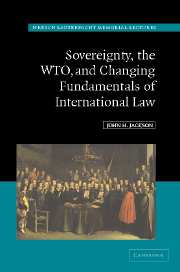Book contents
- Frontmatter
- Contents
- Preface
- Table of statutes and regulations
- Table of cases
- Part I Challenges to fundamental assumptions of international law
- Part II The WTO
- 4 The WTO as international organization: institutional evolution, structure, and key problems
- 5 The WTO dispute settlement system
- Part III The search for solutions
- Appendix: Outline of the Uruguay Round treaty establishing the World Trade Organization
- Notes
- Index
5 - The WTO dispute settlement system
Published online by Cambridge University Press: 29 March 2011
- Frontmatter
- Contents
- Preface
- Table of statutes and regulations
- Table of cases
- Part I Challenges to fundamental assumptions of international law
- Part II The WTO
- 4 The WTO as international organization: institutional evolution, structure, and key problems
- 5 The WTO dispute settlement system
- Part III The search for solutions
- Appendix: Outline of the Uruguay Round treaty establishing the World Trade Organization
- Notes
- Index
Summary
This charter would deal with the subjects which the Preparatory Committee has assigned to its five working committees. It should deal with these subjects in precise detail so that the obligations of member governments would be clear and unambiguous. Most of these subjects readily lend themselves to such treatment. Provisions on such subjects, once agreed upon, would be self-executing and could be applied by the governments concerned without further elaboration or international action.
Harry Hawkins, representing the US, speaking of the proposed ITO Charter, 1946.We must never forget, that it is a constitution we are expounding,
Chief Justice John Marshall, 1819.The WTO dispute settlement system – unique, a great achievement, controversial
Section 4.2 discussed the emphasis that eminent economists put on the essential role of institutions in ensuring that markets work satisfactorily. This principle can be expanded to apply to many contexts, such as keeping the peace, protecting human rights, and generally reforming “constitutional” structures. These thoughts inevitably lead to questions as to how (or whether) certain rules work. The WTO dispute settlement system then becomes a link in the chain of logic about these human affairs.
This thought process clearly plays a central role in the policy foundations of the world economic system. At the 1946 beginning UN conference, assembled to draft an ITO charter (described in section 4.3), a remarkably and directly relevant statement was made by one of the conference leaders, a US representative named Harry Hawkins.
- Type
- Chapter
- Information
- Publisher: Cambridge University PressPrint publication year: 2006



